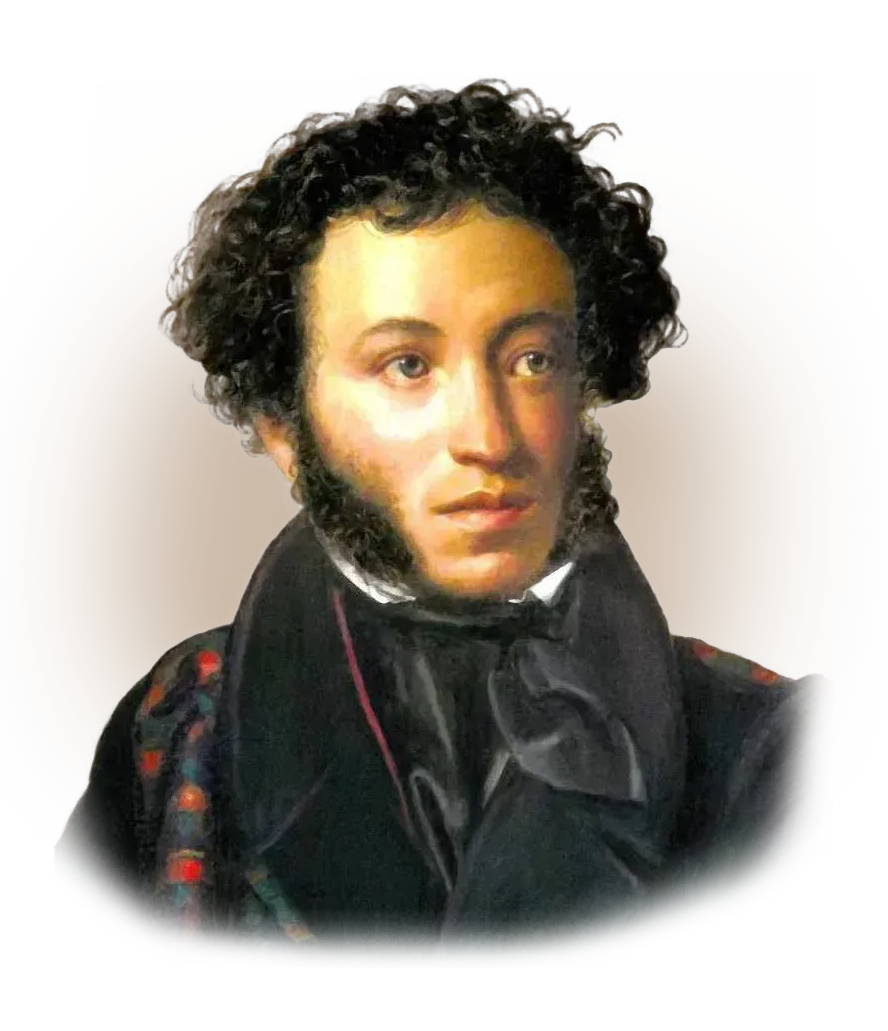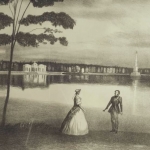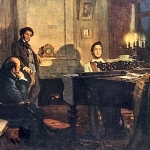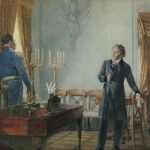
06.01.2023
Acquaintance with the future Decembrists. Political Poems and Outrage (1817-1820).
After graduating from the Lyceum in 1817, Pushkin settled in St. Petersburg. He was immediately accepted into the literary society “Arzamas”, where at that time the members of the Welfare Union began to put forward ideas about the socio-political content of literature.
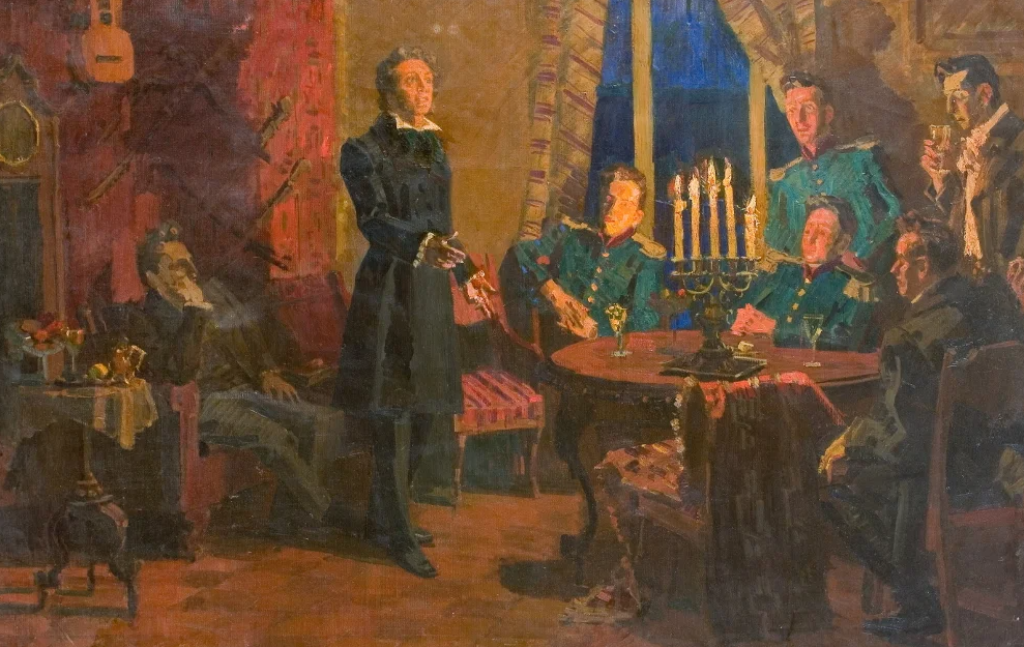
(many participants of which will participate in the uprising of 1825) — Mikhail Orlov, Nikita Muravyov and Nikolai Turgenev. Having become closer to the latter, Pushkin got into the circle of young “liberalists”, under the influence of which, apparently, his political poems of those years – “Liberty”, “Village”, epigrams on Sturdza (“The servant of the crowned soldier …”) and Alexander I (“Hurrah! he’s jumping to Russia…”). However, despite theDue to the sharpness and topicality of these texts, they remained quite traditional for civic poetry of the XVIII — early XIX century: they used images and plots that had long been known and familiar to contemporaries.
The power of Alexander I’s anger, who accused Pushkin of “flooding Russia with outrageous poems,” as well as the rapid fame of Pushkin’s uncensored poems, was explained not only by the qualities of the texts themselves, but also by Pushkin’s defiant actions known in society.
“Pushkin, sitting in an armchair in the theater, showed the people next to him a portrait of the murderer of the Duke of Berry Louvel with the inscription: “A lesson to the tsars.”
Departure to St. Petersburg on the eve of December 14, 1825
The story of Pushkin’s failed trip to St. Petersburg on the eve of December 14 was recorded many times by his contemporaries from the words of the poet:
“Here is another story… of my unforgettable friend, which I have heard more than once in front of strangers.
The news of the death of Emperor Alexander I and the resulting fluctuations on the issue of succession reached Mikhailovsky around December 10. Hoping that under such important circumstances they would not pay strict attention to his disobedience, he decided to go there. So, Pushkin orders to prepare the cart, and the servant to get ready with him to St. Petersburg; he himself goes to say goodbye to the Trigorsk neighbors. But on the way to Trigorskoye, a hare runs across the road; on the way back from Trigorskoye to Mikhailovskoye, another hare! Pushkin arrives home in frustration; he is informed that the servant appointed to go with him has suddenly fallen ill with white fever. Lo and behold — a priest meets at the gate, who was going to say goodbye to the departing gentleman. All these meetings are beyond the power of the superstitious Pushkin; he returns home from the gate and stays in his village.”
is obviously mythologized, this story is supplemented by the fact that Pushkin, having made himself a fake “ticket”, left Mikhailovsky under the name of serf Alexei Khokhlov.
The interpretation of Pushkin’s “Trigorskaya neighbor”, Maria Osipova, seems more convincing. According to her memoirs, Pushkin decided to urgently return to St. Petersburg not before, but after he learned about the outbreak of the uprising:
“Arseny told me that there was a riot in St. Petersburg, there were patrols and guards everywhere…Pushkin, hearing Arseny’s story, turned terribly pale. The next day. Pushkin quickly packed up for the road and went; but, having reached the graveyard of Vreva, he returned back.”
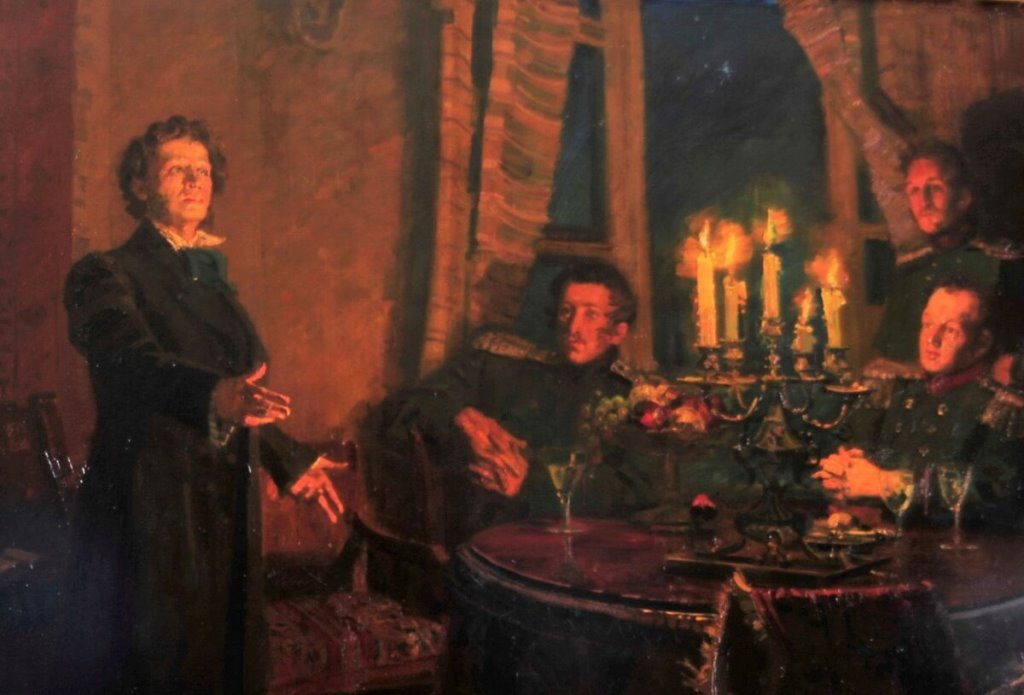
The logic of this assumption, however, does not explain whether Pushkin really considered the hare running across the road a bad omen or stayed in Mikhailovsky for some other reason – the problem largely lies in the fact that Osipova was 5 years old in 1825.
Pushkin did not renounce his friendship with the Decembrists, however, he did not express his agreement (or disagreement) with their program. Pushkin ‘s ambiguous attitude towards the Decembrists is also evident in the rest of his statements:
“I have never liked revolt and revolution, it is true; but I have been in touch with almost everyone and in correspondence with many of the conspirators.”
During the investigation into the case of the Decembrists, there was no direct evidence of Pushkin’s participation in any of the secret societies, however, there was often a mention of “freedom-loving poems” — “Liberties”, “Dagger” and “On December 14” (excerpt from “Andrei Chenier”). Contemporaries also preserved the story of the uncensored version of the poem “The Prophet”.
Arriving at the Kremlin palace, Pushkin had a firm determination, in case of an unfavorable outcome of his explanations with the sovereign, to hand this poem to Nikolai Pavlovich at parting.”
Fluctuations in Pushkin’s attitude to the December 14 uprising continued after the completion of the Decembrist case. Thus, the contradiction between the freedom—loving lyrics and the pro-monarchic poems written after the audience with Nicholas I created the myth of “Pushkin – the friend of the monarchy,” in the words of Alexander Blok. Attempts to find a compromise with the authorities in the poems “Stanzas” and “Slanderers of Russia” were combined at this time with the prohibition of the publication of “Boris Godunov” and “Andrei Chenier” — the result of allegedly personal censorship by Nicholas I.
At the same time, in 1826-1827, Pushkin wrote a message “In the depths of Siberian ores” and a poem “Arion”, in which an allegorical image of the Decembrist uprising is often found. Meanwhile, in the image of swimmers in the Arion, contemporaries did not see the Decembrists, but rather themselves, who survived the “whirlwind of the storm” on December 14. By publishing the poem anonymously, Pushkin moved away from expressing personal assessments and included himself in the course of the general history. Probably, the events of December 14 were also perceived by Pushkin as part of history — this topic did not define his work, but was one of the most important and was integrated in a complex way into his worldview system.
